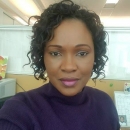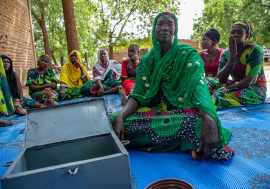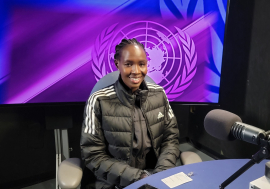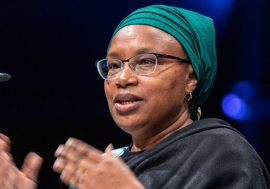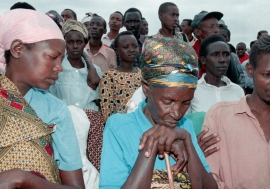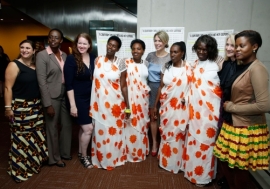Ambassador Valentine Rugwabiza from Rwanda is one of only a handful of African female Permanent Representatives of their countries to the UN in New York. In Africa Renewal’s series profiling the African women representing their countries at UN Headquarters, she spoke with Zipporah Musau about her priorities, the challenges so far and why she is advocating for more female Permanent representatives. Here are excerpts:

Africa Renewal: Let's start with your journey to this role? How has that been and what would you say are your top three achievements so far?
Amb. Rugwabiza: Thank you, for the opportunity to have this conversation. We feel at home with Africa Renewal.
I've been working for a little bit more than 30 years now. That's a long time but in Africa, people are proud of senior age and what it means in terms of experience and wisdom. Most of my career has been divided between private sector and civil service - both in my own country and as an international civil servant.
I started my professional career in the private sector where I spent about 10 years, and then moved on to set up a company in Rwanda, which I co-managed with a sister. I organized and started an association of women entrepreneurs in Rwanda. I'm also a founding member of the Federation of the Private Sector in Rwanda. However, the influence and the role of women was missing there. Women were active in business, even in our specific and challenging circumstances post-1994, but their role was not reflected in the management of the federation at all levels. So, we organized to have women represented.
Then I was offered the opportunity to represent Rwanda at the UN in Geneva as a Permanent Representative and Ambassador. I did this for three years and then I was appointed as Deputy Director-General of the World Trade Organization (WTO), becoming the first woman in this position. So, you can just imagine how thrilled I am at this particular time, because we have the first female Director-General of the WTO - Dr. Ngozi Okonjo-Iweala.
From there, I went back to Rwanda where I was appointed the Cabinet Minister in charge of Investment, and later Minister for East African Regional Integration Affairs. It is from there that I was appointed to my current position where I have been for the last four years.
What would you say is the common thread in this journey?
In all the different spheres of my career - be it in the private sector, as an international civil servant, or at the national level - what has driven me all along has been to have more inclusion. I'm a strong believer in inclusion and I know that a system, or a country, that is exclusive, cannot be sustained. And I hope this is one of the lessons that we are learning from the global COVID-19 pandemic. One has to ask, why is it that rich countries that have so much in terms of resources have lost so many lives? It is because of only one reason - exclusion and inequalities. It has nothing to do with wealth, or limited resources, or limited capabilities, to take care of the people. The capabilities are there, but some people have been structurally and institutionally excluded. When you have a system that is built on exclusion, the moment you are hit by a global challenge, those inequalities become bare and are exposed.
So, for me, it has been inclusion, mainly of women and of Africans. It's the inclusion of the priorities, the different concerns, and the different perspectives. If your own perspectives are not taken on board, then the global or regional outcome cannot work for you.
Inclusion must be from inception. It cannot be that we do everything - the planning, the strategies, and even agree on the different resources and ways to implement those strategies - and once all that is ready, we then invite some Africans around the table. That is not inclusion, it is cosmetic.
It is also the inclusion of youth. Now, I don't mean that this comes at no cost. There is a not-so-smart way of excluding the youth everywhere in the world, such as requirements in terms of experience. Of course, it takes effort and time to invest in training them and grooming them. If we don't include the youth, if we don't train them and make sure that they are not only given the learning platforms, but they also understand how they can make their contribution count, then you are basically all about yourself. By the time you leave office, you may have had a great career, yes, but in terms of systemic change, there will be not much that you would have achieved.
What would you say are your top three achievements as Rwanda's Permanent Representative to the UN here in New York?
Rwanda is one of the major troop-contributing countries of UN peacekeepers. We are actually among the top three troop contributing countries, with around 6,000 of our women and men in uniform deployed in different peacekeeping missions.
This clearly shows that peacekeeping, peace and security are very important to us, because it has to do with our own history. At our hour of most need [during the 1994 genocide against the Tutsi in Rwanda], we were abandoned by the international community, the peacekeeping mission that was in Rwanda at that time was instructed by the UN Security Council to leave.
I should mention here that, despite those instructions, one contingent decided to stay – the Ghanaians. We will never forget that, no matter after how many generations. For them, our lives mattered. They didn't prevent the genocide, but they saved a few thousands of lives.
Also, the late Captain Mbaye Diagne, a Senegalese peacekeeper, decided not to leave and lost his life saving lives. We didn't see humanity from those who were responsible for the maintenance of peace and security. No, we saw humanity from fellow Africans, at their own lives' risk. So, now we know - in our in our hearts, in our minds, all of us - it is Africa that we really have to protect. We have to be there for one another. So, for us, making sure that there is peace and security in Africa is what we have invested in and make our own contribution to, no matter how small.
We have also contributed to strengthening the concept of protection of civilians. We have even made it a little bit more normative through what we call the Kigali Principles on Protection of Civilians - providing clear protection guidelines in situations that are not necessarily as extreme as the genocide against the Tutsi in 1994, and also how to prevent [such situations], and more importantly, how to protect instead of abandoning people.
Also, I have personally co-chaired successfully a Resolution on the reform of the peace and security pillar at the UN, which emphasizes, among others, prevention, and delegation of authority to the Commandant, to those on the ground, and making sure that we are nimble and can act in an effective way.
It was also during this time that, for the very first time, it was codified at the UN General Assembly that what took place in Rwanda in 1994 was a 'genocide against the Tutsi’ – initially in 2018 and again last year in 2020. This is of great significance to us because we know what the distortion of history, or denial of history, can lead to. It is the very minimum we owe, first, to the survivors after having lost so much to protect the dignity of those we have lost, and to all of the Rwandan society.
What would you consider the most challenging part of your job so far?
Oh! The most challenging part of this job is not unique to Rwanda. It is a challenge that is common to most African delegations. We have very, very, small teams in our missions, and yet we cannot afford to be absent because that is the nature of diplomacy - you influence through engagement. This problem is common in about 80 per cent of African missions here in New York. If you compare the Mission of Rwanda with any of the European missions, they have five or six times the number of diplomats, yet the member states’ responsibilities are the same. However, even though we have very small teams, we have high ambitions and are making major contributions.
Is there another challenge you like to highlight?
For me, I also look at the challenges faced by African countries. It is very important to have effective coordination with what is happening on the continent, we need an institutionalized mechanism of coordination. As you know, the AU Heads of State Summit takes place twice a year. We cannot depend on this summit to get our decisions and then integrate them in the African Group's priorities. We have to have a system that works on a more permanent basis.
Moving forward, what would you say are your top three priorities for this 2021?
Health equity and inclusion remain the top priority. On health equity, we are all seeing what is happening with the COVID-19 vaccine, so vaccine equity is a top priority. What has happened with the COVID-19 vaccine is a barometer of whether international cooperation functions or not. And so far, the verdict is that it is dysfunctional. This means that we need to make sure that the so-called ‘common good’ is really acted on as common good. But more specifically on health, it will be to make sure there is mobilizing for health resilience, to build resilient systems.
Also, gender equality and women empowerment will continue to be an important issue for us. We have consistently remained among the top 10 champions of the 'He for She' campaign [a UN campaign on gender equality].
Also, I took over at the end of last year [2020] the co-chairing with the Permanent Representative of Qatar, of the Group of Friends on Gender Parity, that brings together more than 150 countries. We want to ensure that the gender parity we are seeing in the UN Secretariat is not only limited to senior-level positions. Yes, Secretary-General António Guterres has done an excellent job in achieving gender parity at the senior levels. However, real gender parity and real integration happen at the middle management level. So, this needs to be continued and be part and parcel of performance of managers.
You’re also probably aware that Rwanda is often referred to as a 'digital country'. So digital inclusion will continue to be a top priority for me and for our country.
I will also mention one more area - sustainable development. I am co-leading with a few other friends, work on recovering better and sustainably from the COVID-19 pandemic, as it has brought so much suffering. We have to make sure we change the way we do things and that we really work on inclusion, sustainability and resilience in a more solid way.
And then of course and even if I'm mentioning it last, it is certainly not the least. Peace and security are the foundation of everything, and we have to make sure that we make our own contribution in solving the conflicts on the continent.
There are a few female African Permanent Representatives to the UN. Currently of African countries, only Angola, Chad, Eritrea, Rwanda and South Africa have women serving as their country’s Permanent Representatives. Madagascar also has a woman serving as the Chargée d’affaires a.i. What do you think needs to be done to increase that number?
Well, we need to continue at different levels to sensitize our own leadership about the importance of achieving, if not parity, then much better representation in our diplomacy, not just in the largest multilateral platform, which is New York, but also in other multilateral platforms, such as Geneva and Addis Ababa.
Sometimes it's important also, to expose the numbers, to share the data on female representation. And by the way it is not just a problem with Africa only. A few months ago, I met with my colleague from the Netherlands. And although the Netherlands has been a strong advocate of gender equality, the current ambassador of Netherlands is the very first female Ambassador to the UN. And, this is not an isolated case. So, of course, we look more at the African continent, but you will be surprised that we actually fare better than other regions. I would say with the only exception being the Caribbean, which is doing very well when it comes to real representation of women in senior positions.

